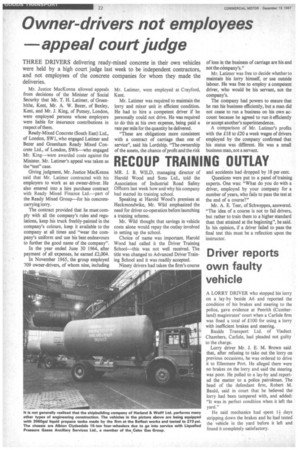Owner-drivers not employees —appeal court judge
Page 24

If you've noticed an error in this article please click here to report it so we can fix it.
THREE DRIVERS delivering ready-mixed concrete in their own vehicles were held by a high court judge last week to be independent contractors, and not employees of the concrete companies for whom they made the deliveries.
Mr. Justice MacKenna allowed appeals from decisions of the Minister of Social Security that Mr. T. H. Latimer, of Greenhithe, Kent, Mr. A. W. Bezer, of Bexley, Kent, and Mr. J. King, of Putney, London, were employed persons whose employers were liable for insurance contributions in respect of them.
Ready-Mixed Concrete (South East) Ltd., of London, SW!, who engaged Latimer and Bezer and Greenham Ready Mixed Concrete Ltd., of London, SW6—who engaged Mr. King—were awarded costs against the Minister. Mr. Latimer's appeal was taken as the "test" case.
Giving judgment, Mr. Justice MacKenna said that Mr. Latimer contracted with his employers to work as an owner-driver. He also entered into a hire purchase contract with Ready Mixed Finance Ltd.—part of the Ready Mixed Group—for his concretecarrying lorry.
The contract provided that he must comply with all the company's rules and regulations, keep his truck freshly-painted in the company's colours, keep it available to the company at all times and "wear the company's uniform and use his best endeavours to further the good name of the company".
In the year ended June 30 1964, after payment of all expenses, he earned £2,004.
In November 1965, the group employed 709 owner-drivers, of whom nine, including Mr. Latimer, were employed at Crayford, Kent.
Mr. Latimer was required to maintain the lorry and mixer unit in efficient condition. He had to hire a competent driver if he personally could not drive. He was required to do this at his own expense, being paid a rate per mile for the quantity he delivered.
"These are obligations more consistent with a contract of carriage than one of service", said his Lordship. "The ownership of the assets, the chance of profit and the risk of loss in the business of carriage are his and not the company's."
Mr. Latimer was free to decide whether to maintain his lorry himself, or use outside labour. He was free to employ a competent driver, who would be his servant, not the company's.
The company had powers to ensure that he ran his business efficiently, but a man did not cease to run a business on his own account because he agreed to run it efficiently or accept another's superintendence.
A comparison of Mr. Latimer's profits with the £18 to £20 a week wages of drivers employed by the company confirmed that his status was different. He was a small business man, not a servant.












































































































